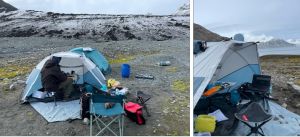El investigador del CNB Javier Tamames, que ha implementado el sistema, nos explica los detalles experimentales: “La combinación de tecnologías nos permite extraer el ADN microbiano, purificarlo y además secuenciarlo con un pequeño secuenciador comercial, directamente en el lugar de muestreo. Hemos desplegado un laboratorio portátil capaz de funcionar de forma autónoma sobre el terreno, y para ello ha sido clave disponer de una herramienta de análisis bioinformático fiable desarrollada por nosotros, el software SqueezeMeta” destaca el investigador. “Con este software hemos conseguido agilizar y automatizar todo el proceso de identificación de microrganismos a partir de sus secuencias de ADN”.
“Nunca antes se había podido generar información tan completa sobre la composición y función de una comunidad microbiana en un plazo tan corto. Esto abre la puerta a numerosas aplicaciones donde la rapidez en el análisis sea fundamental”, añade Tamames, investigador del CNB.
En la Antártida existen regiones inexploradas donde habitan microorganismos, muchos de ellos aún desconocidos, como los que colonizan las rocas que quedan expuestas tras el retroceso del hielo en los glaciares o las lavas volcánicas. Para identificarlos, habitualmente se recogen muestras que posteriormente se analizan en los laboratorios mediante técnicas de secuenciación genómica masiva y análisis bioinformáticos. Los integrantes del proyecto Rock-Eaters han ido un paso más allá, llevando al terreno la tecnología necesaria para realizar el análisis experimental y bioinformático según se tomaban las muestras.
“Esta metodología nos ha permitido procesar los datos de secuenciación durante el trabajo de campo y diseñar así los muestreos y experimentos de un modo dinámico y más certero, tomando decisiones de forma rápida, sin tener que esperar a nuestro regreso a España para finalizar el proceso”, comenta la investigadora del MNCN Asunción de los Ríos. “En campañas anteriores, intuías donde debías tomar muestras y esperabas obtener buenos resultados. Con este sistema de trabajo sabes si vas por buen camino desde el principio y en función de eso puedes ir seleccionando las áreas de muestreo y garantizar que estás obteniendo los datos que necesitas para la investigación”, recalca de los Ríos.
Los resultados obtenidos son de gran interés para entender el papel de los microorganismos en los ecosistemas terrestres antárticos. “Identificando los microorganismos presentes en rocas antárticas podemos valorar mejor cuál es su contribución al funcionamiento del ecosistema”, concluye Fernando Garrido, también del MNCN.
Sergio Camero, Comunicación CNB-CSIC
Xiomara Cantera, Comunicación MNCN






